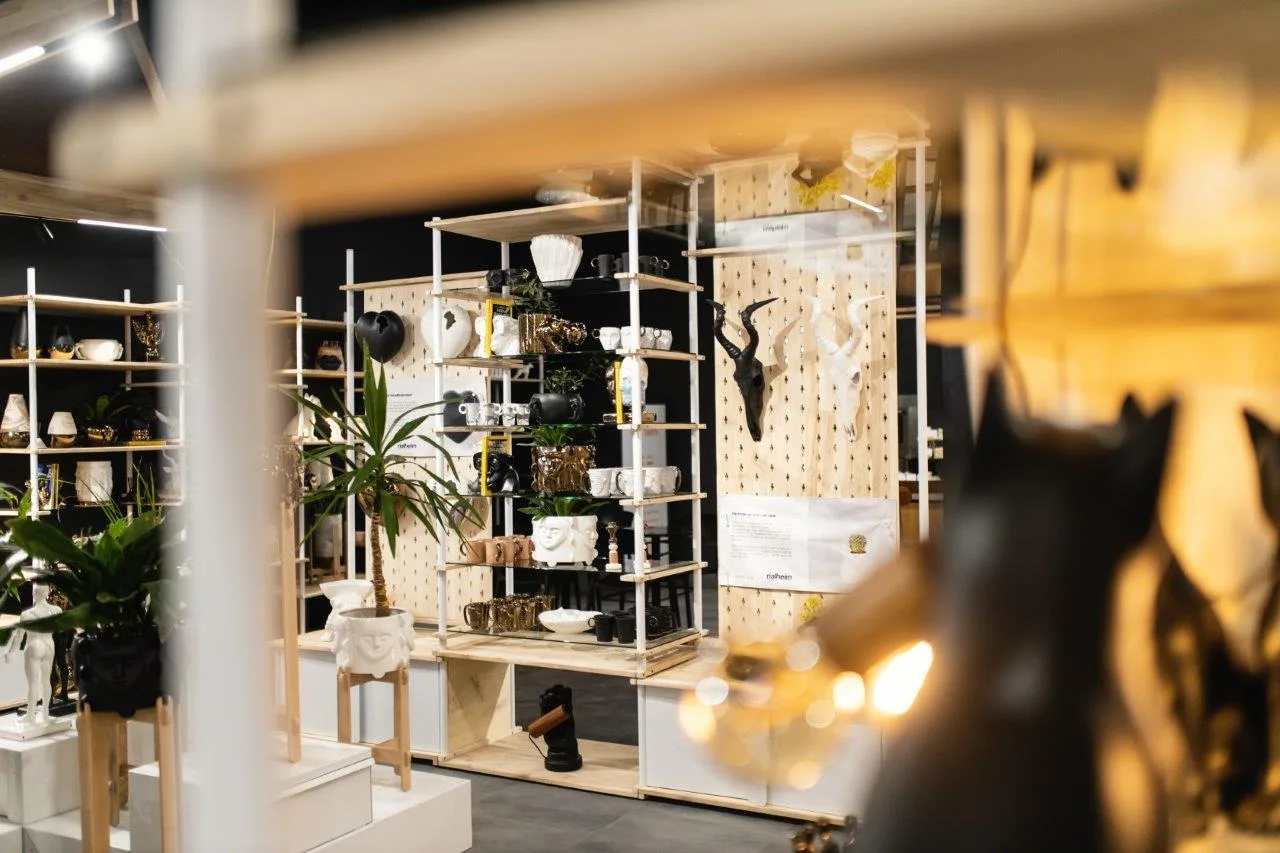One of the major struggles when it comes to sustainable shopping is where to go. Though many of us know that we can shop on platforms like Instagram, there are still many South Africans that are resistant to doing so and would still, even during a pandemic, prefer to go to a brick and mortar store. Understanding this is what brought about SOKO district. At a time when we are all looking to go back to basics, a classic retail space that has been created with ethical shopping at its core may well be the answer. The first of the SOKO district stores has officially opened at the Rosebank mall and is well worth checking out.
SOKO at a glance

Image of SOKO District courtesy of Angelfish PR
There is no doubt that the SOKO district is a beautiful space and one where there is something for everyone. The brands on offer are wide-ranging and extensive and though the space is divided into brands, similar to the set-up of Edgars, it is perhaps easier for the consumer to navigate. The shop space is wide and open, appropriate for the current situation where the Covid-19 pandemic is at the front of all of our minds.
Looking at it from the outside, the store is a lot like a blank canvas. Lots of clean, open spaces and neutral colors are inviting from a consumer perspective. Just looking at the store from outside, you already know that it’s something different. Neutral colors and wooden shop fittings are the names of the game. In fact, the shop fittings are clearly designed to fade into the background and allow the products to shine.
Why is it called SOKO District?
The word ‘soko’ actually means market in Swahili and is according to the press release for the brand “traditionally driven by the collective art of buying and selling goods in an open space”. This is, of course, the idea behind the brand – to create a market-like space within a mall where customers are free to browse more than just one brand at a time.
Another benefit of this way of shopping is that it opens customers up to brands they may not have even heard of before. A customer might go in just for a brand that they know, for instance, Danielle Frylinck but, in doing so, they are likely to be introduced to many of the other brands on offer, which is likely to lead to an increase in consumer brand awareness.

Image of SOKO District courtesy of Angelfish PR
Having all these small brands in such an accessible space means that people don’t have to look further than a local mall to support local, sustainable brands. Ultimately, the easier we make it for people to make the better choice, the more likely they are to do so.
Sustainability at its core
When it comes to sustainability, SOKO is perhaps at the top of its class. The entire idea of a sustainable space would not work if it wasn’t for the determination of the brands within. The SOKO store aims to provide a blank canvas for the brands it hosts.

Image of SOKO District courtesy of Angelfish PR
All the individual spaces are easily customizable, and this allows the brands to make the spaces work for them. Of course, the thing with shop fittings is that they need to be changed often in order to make the space exciting for returning customers and inviting for new ones. But changing shop fittings can be extremely wasteful. So, in an effort to combat this, instead of just throwing away old shop fittings and shop branding, they are recycled into shopping bags.
Allowing small, local brands to prosper
SOKO District is full of the very best local brands. These are all brands that might otherwise be unable to even think about opening in a mall-like Rosebank. If you think about the South African retail space, it’s clear that most of us would rather go to a mall than shop around.
High-street shopping is generally not a big thing in South Africa, especially in Johannesburg. Beyond places like Parkhurst and Melville, we generally choose to congregate under the comfortable, safe, and air-conditioned roofs of shopping centers. That is what the SOKO district is designed to do – bring small, local brands into shopping centers. Because when shopping locally is accessible, we’re all more likely to do so.

Image of SOKO District courtesy of Angelfish PR
Brands in the Rosebank store include:
- Nu Nues classic baby and toddler wear are made locally using fair trade, natural textiles, and no plastic.
- Annapatat Kids is a locally made baby and toddler label
- The Oliver Vagary collection of uniquely handcrafted leather products in a classic style
- Rialheim ceramic studio “specializes in shapes and glazing techniques that are inspired by Africa’s diverse cultures and beauty”.
- Flight which offers premium coffee, pastries, and chocolates
- Local luxury fashion brand Mahone The Quiet Junkie
- Well-known leather shoe company Bummel Shoes
- Clothing brand MOS Wear
- Women’s fashion line’, Kayla Stam.
- “Anywhere leisurewear” brand KoiKoi Clothing
- Well-known womenswear designer Danielle Frylinck
- Accessory and watch brand Era by DJ Zinhle
- Just Rrrraw Chocolate
- Old-fashioned handcrafted toffees from Darling Sweet
- Handmade whimsical small-batch lollipops from The Lollipop League
- Fashion accessory brand Ledikana
- Gluten and refined sugar-free range of plant-based butters from Graze
- The Chairman Home furniture company
- Mpahla Sneaker & Apparel a proudly South African unisex, stylish sneakers and apparel brand
References
https://www.pwc.co.za/en/press-room/digit-retail.html
Press release from Angelfish PR



![women [longevity live]](https://longevitylive.com/wp-content/uploads/2020/01/photo-of-women-walking-down-the-street-1116984-100x100.jpg)










